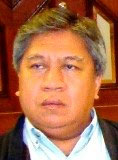PDRCI approved at the meeting of its Board of Directors on October 20, 2014 the appointment of Francisco Pabilla, Jr. as assistant Secretary General effective November 1, 2014. Bing, as Mr. Pabilla is known, will be under contract for an initial three months until January 31, 2015.
 He will act as the Center’s executive director in charge of its day-to-day operations, assisting the President and the Secretary General. He will focus initially on the publication of the fourth edition of the Handbook on Commercial Arbitration before preparing a manual of operations of PDRCI.
He will act as the Center’s executive director in charge of its day-to-day operations, assisting the President and the Secretary General. He will focus initially on the publication of the fourth edition of the Handbook on Commercial Arbitration before preparing a manual of operations of PDRCI.
Mr. Pabilla studied political science at the University of the Philippines in Diliman. In 1989, he received his master of arts in development studies at the Institute of Social Studies in The Hague, where he majored in public policy and administration.
He attended various ADR training programs locally and internationally. In 2005, through the auspices of the Association for Conflict Resolution in Los Angeles, California, he participated as a mediation observer at the Federal Employment Opportunity Commission.
Mr. Pabilla is an accredited mediator of the Supreme Court of the Philippines. He was the executive director of the Philippine Mediation Foundation, Inc. He assisted the Supreme Court in the training and supervision of mediators in Metro Manila and the setting up of Philippine Mediation Center (PMC) units in all the 17 local government units in the National Capital Judicial Region. In 2008 until 2010, he served as mediation adviser to the Philippine Mediation Center Office of the Philippine Judicial Academy.
Mr. Padilla is an adjunct professor of political science at the Philippine Christian University, where he also serves as a member of the Faculty/ Staff Grievance Committee. He is a member of the Bid Challenge Tribunal of the Millennium Challenge AccountPhilippines and a lecturer of the Office for Alternative Dispute Resolution of the Department of Justice.
Online dispute resolution and its prospects in the Philippines
Part 1, published in the April2014 issue, discussed the concept of ODR, its brief history, and ODR practices in other countries.
ODR and ADR mechanisms
 Online dispute resolution or ODR employs alternative dispute resolution (ADR) mechanisms online, rather than offline as is conventionally done. In particular, ODR facilitates negotiation, widely considered as the most commonly practiced form of dispute resolution.
Online dispute resolution or ODR employs alternative dispute resolution (ADR) mechanisms online, rather than offline as is conventionally done. In particular, ODR facilitates negotiation, widely considered as the most commonly practiced form of dispute resolution.
Betancourt and Zlatanska use the term “e-negotiation” to refer to ODR through negotiation. They observed that “With the advent of the Internet, this form of interaction, particularly within the dispute resolution arena and the legal profession, has somewhat moved off the court corridors and polished offices of a law firm on to the Web, which resulted in the advancement of the idea of electronically based negotiations.” (Betancourt & Zlatanska, supra, p. 259)
ODR may also be employed in mediation. Mediation here is system-based, instead of being face to face. The parties and the neutral may rely on online text (e.g., email) or video conferencing in conducting the proceedings. Meanwhile, in online arbitration, the parties, the arbitral tribunal, experts and witnesses makeuse of electronic devices to participate in the proceedings.
It has been said that online ODR is particularly appropriate in simple factual contexts and small claims. Hence, it has been recognized that “online arbitration may appeal to the users of small claims and documentsonly arbitration schemes, but definitely not to the users of ‘international arbitration,’ where complex issues and large amounts of money are at stake.” (Id., p. 260-3).
Pros and cons of ODR
Perhaps the most recognized disadvantage of ODR is the lack of personal interaction among the parties involved in the dispute. Joel Eisen observed that ODR processes “impose an electronic distance on the parties” (Joel Eisen, Are We Ready for Mediation in Cyberspace?, B.Y.U. L. REV. 1310, Vol. 1998, Issue 4) contrary to the dynamics of ADR, which is usually held face to face.
For example, mediation is usually done in an informal in-person discussion among participants. It involves the venting of feelings and expression of emotions, which would be difficult if parties communicate via their computers. It has also been observed that email negotiations increased contentiousness; diminished information sharing, cooperation, and trust; and increased effects of negative attribution (Betancourt & Zlatanska, supra, p. 260).
Aside from these, there is also the problem of access to computers and the Internet, particularly disputes arising from otherwise offline transactions. Another is the disadvantage on the part of a party who is unfamiliar with the use of computer technology or at least not savvy enough to get by the online processes. Not the least of disadvantages is the problem of security and confidentiality of online communications, which typically result in the creation not only of physical but also electronic records (Rafael Morek, Regulation of Online Dispute Resolution, available at http://odr.info/workingpapers, last accessed Oct. 28, 2014).
But there are also several advantages in adopting ODR. Among these is the reduction of travel and costs, allowing for better time and cost management. Distance is one of the most difficult challenges to dispute resolution. With ODR, parties may actively participate in the process while in their homes or offices. ODR also removes the need to reproduce and transport relevant documents and lease a neutral office in which to hold the proceedings.
Scheduling of proceedings is also a lot easier and flexible in ODR, since online facilities may be made available 24/7. The lack of personal interaction among the parties has also been viewed as advantageous in some instances. For example, it may be preferable for the disputants not to meet in person as when the dispute is emotionally charged and liable to get out of control (Ibid.). Too, online communication does not necessarily preclude the parties’ expression of their feelings and emotions. In fact the ‘electronic distance’ inherent in ODR the parties to sincerely
voice their concerns and feelings.
Prospects for ODR in the Philippines
In the Philippines, the Special Rules of Court on Alternative Dispute Resolution expressly recognizes ODR, which is defined therein as “all electronic forms of ADR including the use of the Internet and other web or computed based technologies for facilitating ADR.” (Supreme Court A.M. No. 07-11-08-SC, Rule 25.2)
Atty. Patricia Prodigalidad notes in her working paper presented before the ASEAN Law Association the rise of ODR “from a mere theoretical application acknowledged in the ADR Law to an acceptable and utilized mode of dispute resolution in the Philippines.” (Building an ASEAN Mediation Model: The Philippine Perspective 9, Workshop Paper, ALA 11th General Assembly, Bali 2012) She noted that the Department of Labor and Employment successfully resolved the claims of 13 disgruntled workers through Skype, without the parties appearing in court.
Overall, there are good prospects in adopting at least some ODR mechanisms in the Philippines, which was recently named social networking capital of the world (Jon Russell, Philippines named social networking capital of the world, available at http://asiancorrespondent.com/54475/ philippines – named – social – networking – capital-of- the- world- indonesia-malaysia- amongst-top-10/, last accessed Oct. 28, 2014). For one, the Supreme Court has consistently encouraged the use of alternative modes of dispute resolutions in order to unclog court dockets and expedite the resolution of disputes, not to mention cutting down costs. The adoption of ODR processes is a step toward these objectives.
ODR mechanisms may also be infused in court proceedings such as electronic filing and the installation of case management systems. The need for ODR processes is made even more compelling by the approaching ASEAN regional economic integration in 2015. As commercial transactions become more and more borderless, the need for ODR mechanisms becomes more apparent.
